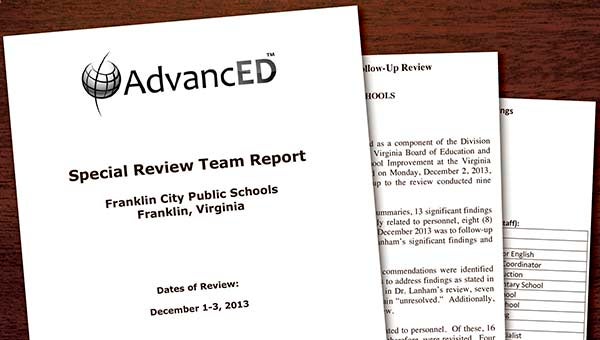Reviewed: Franklin school system found wanting
Published 2:06 pm Thursday, January 23, 2014
RICHMOND—An AdvancED special team spent three days in Franklin during December interviewing stakeholders with the Franklin City Public Schools. On Wednesday afternoon, the Virginia Department of Education released the three-document Division-Level Review to The Tidewater News.
The school system was placed on Division-Level Review status in October 2013 at a regular session for the Virginia Board of Education.
AdvancED, which is a worldwide company that assists in accreditation and school improvement, was the company selected by VDOE to carry out the review. The team interviewed the school board, the superintendent, members of the central office leadership, the school principals, parents and community representatives, including the mayor, city manager, city council members, the Franklin Education Foundation and members of the faith-based community. They also conducted an audit of academic and personnel files.
Regarding the document, Superintendent Dr. Michelle Belle declined to comment, stating that she prefers to wait until after she discusses the report with VDOE.
School Board Chairwoman Edna King also chose not to comment. She said the board was trying to schedule a meeting for next week to discuss the information in open session.
FINDINGS
The main document examined two of AdvancED’s standards and nine indicators.
For each of the indicators, the Franklin system was placed at level 1, which is the lowest possible level.
Regarding a system-wide purpose statement, the review concluded that there was no process to evaluate or revise.
Further, when asked what the purpose of the school system was, four of the board members interviewed gave personal statements such as, “To meet the needs of all students.”
Community stakeholders had not been involved in any updates of the purpose and direction, and they were not aware of a process to become involved.
At the three schools, the team found a lack of documented evidence regarding the process used to develop and implement each school’s purpose and direction.
The external review team concluded that alignment between a school’s vision and the system’s vision/purpose was not present, as communicated to them.
A plan for professional development didn’t fare much better, as there was very little agreement on what was the professional development plan. Two persons interviewed cited differentiation, vertical alignment and data analysis as the three target areas system-wide.
Some people interviewed said the schools were site-based and determined their own focus.
Interviewees also claimed that the school-level perception of the central office was that they were punitive and evaluative, but they added that central office was trying to change that perception.
Once every 4.5 weeks, a select group of central office leadership visits the schools and conducts observations, but the review team determined that this was limited. Results are shared with the principal verbally, but no written results are given to the school leadership and no verbal or written reports of these observations are provided to the teachers by system staff.
“Central office exists to deliver DOE mandates, not to directly support schools and classrooms,” an interviewee told AdvancED.
Regarding the state report card, the team concluded that there was no clear action plan that yielded measurable improvement. The report card shows Franklin not meeting the Federal Graduation Indicator for all students, and that they were not meeting the federal annual measurable objectives in student performance in math.
For supporting student learning, the review concluded that Franklin’s division-level goals reflect the minimum required by governmental oversight agencies.
There were numerous instructional initiatives, but very little evaluated criteria and results of the effectiveness of the initiatives were presented to the review team.
Positions had been added at the schools to help, such as a deans of students, but no accountability measures were shared to link these personnel decisions to improved student achievement.
Further, school system office personnel did not communicate their evaluations being tied to improvements in student and school performance.
AdvancED found that the school board has no method for or does not ensure that decisions and actions are free of conflict of interest, are ethical and in accordance with defined roles and responsibilities. Members rarely or never participate in professional development regarding the roles and responsibilities of the governing body. Evidence also indicated that the school board does not always comply with policies, procedures, laws and regulations.
The review also showcased a disconnect between division-level leadership and stakeholders in the community, as far as sharing information. One example involves closed sessions by the board, suggesting non-compliance.
Routine reports regarding academic progress was reviewed during closed session, according to the report.
Board members also had divergent views regarding the improvement of the school system, as shown in the interviews.
Indicator 2.4 showcased that decisions and actions seldom or never support continuous improvement. The team found little evidence of a desire for collective accountability for student learning. The culture is characterized by a minimal degree of collaboration and little or no sense of community.
Interviewees indicated a lack of openness by the system in providing essential data about the operation of schools and the school system to stakeholders and constituent groups. Community members had little to no knowledge of next steps and turnaround project plans for moving the three schools forward with academic growth.
A number of interviewees stated that they did not want to believe the negativity that was printed in The Tidewater News, but they had no consistent, reliable and internal source of information attempting to be “front and center” in the community.
External stakeholders expressed a lack of confidence in the system because leadership has not shared a clear picture with them of the schools’ labels and the appropriate next steps.
Licensure and personnel also came up negatively – 16 classes across the system are taught by teachers who are not “highly qualified.” Ten classes are taught by people who are not properly licensed or endorsed.
“When there are problems concerning a board’s failure to set policies that create effective practices and educational conditions, interventions are necessary,” AdvancED concluded. “The community must hold its elected and appointed leaders responsible for maintaining a focus on providing quality teaching and learning experiences for all students.”
ACT WITH SPEED
Going forward, AdvancED provided nine required actions to the system.
- Develop and implement a comprehensive, systematic process for establishing, reviewing and revising a clear purpose/direction for student achievement for the school system. The process must include participation by multiple stakeholder groups.
- Develop and implement a comprehensive, systematic process for establishing, reviewing and revising a clear purpose/direction for student achievement for each school in the system. The process must include participation by multiple stakeholder groups.
- Establish and commit to clear levels of accountability for school system and school leadership that result in challenging, equitable learning experiences for all students.
- Evaluate the overall quality of all instructional interventions that have been implemented to improve student, school and system performance.
- Develop and implement a plan whereby the system’s updated policies and practices require and give direction for a system-wide professional growth plan for all staff.
- Ensure that all activities of school board meetings comply with applicable state and federal law to include FOIA, FERPA citations, Code of Virginia and the Franklin City Public Schools Board Policy Manual.
- Involve all stakeholder groups in the development of a revised, comprehensive plan for the school system and ensure the communication of the revised plan, vision and purpose to all stakeholders.
- Develop and implement a formal communication plan that is measurable and sustainable in order to ensure that school system information is shared with all stakeholders in a timely manner. Ensure that the plan is based on an expectation of shared responsibility for effective communication at all levels of the organization.
- Implement supervision and evaluation processes consistently and regularly for all staff to improve professional practices and ensure student success.
“Upon receipt of the report it is incumbent upon the board and the superintendent of Franklin City Public Schools to act with speed and professionalism and address the required actions and directives herein set forth.”






